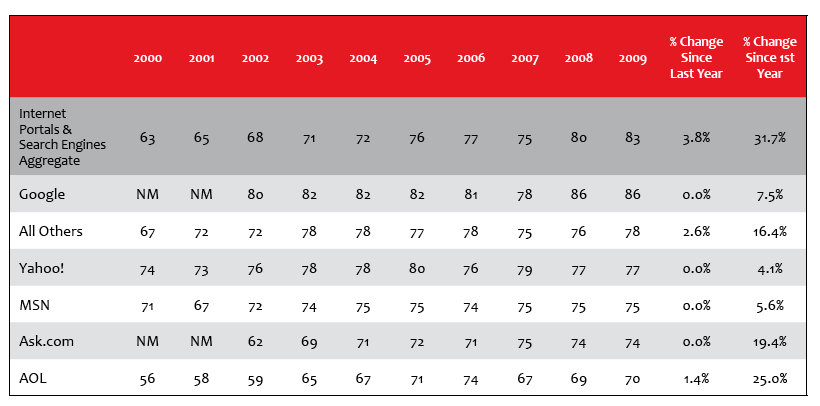Google Tops In Search Satisfaction According To Pre-Bing Survey
On an annual basis the University of Michigan puts out the American Customer Satisfaction Index (ACSI) E-Business report, sponsored and administered by Foresee Results. Among the things the index examines is consumer satisfaction with search engines. The survey asks a representative sample of consumers to rate their experiences with portals and search engines according to […]
On an annual basis the University of Michigan puts out the American Customer Satisfaction Index (ACSI) E-Business report, sponsored and administered by Foresee Results. Among the things the index examines is consumer satisfaction with search engines.
The survey asks a representative sample of consumers to rate their experiences with portals and search engines according to several criteria, which produces an overall score on a 100 point scale. Google is again on top in search with a score of 86, identical to last year. The survey is supposed to be predictive of future consumer behavior, as the associated report argues:
[The ACSI] is a predictor of future success on both the micro and macro level. Google’s huge 10 point jump in satisfaction from 2007 to 2008 preceded a 7% increase in search market share from 2008 to 2009. Satisfaction with Yahoo, on the other hand, dropped 2.5% from 2007 to 2008, preceding a 17.5% decrease in search market share and a 5% drop in portal market share.
When the 2007 results saw Yahoo jump ahead of Google for the first time since the inception of the e-business survey I asked about this asserted relationship between the survey and market share:
The satisfaction data clearly don’t correlate with search market share. I asked [Foresee Results CEO Larry] Freed in this context why people should care and pay attention to the ACSI. Freed was confident that “search market share reflects past behavior. But the ACSI is predictive of future consumer behavior.” He said that historically it has been a very accurate gauge of future consumer behavior in other industries. He added that Google’s decline was a second dip in a row after a smaller decline last year.
Considered over the course of almost a decade of satisfaction rankings, the survey results would indeed appear predictive of market share (for Google), though the 2007 satisfaction win did not correctly predict corresponding market-share gains for Yahoo in 2007-2008.
Source: ACSI/Foresee Results (2009)
According to the survey, conducted before Bing, Google has a significant lead over its competitors, which has widened since 2007.
These overall results line up with a recent search loyalty report from comScore showing Google users as the most loyal.
It’s somewhat disappointing that we’ll have to wait an entire year to see what the ACSI has to say about Bing, because it would give us another opportunity to test the accuracy of the index as a predictor of future behavior.
According to comScore Bing now has an 8.9 percent share of the search market, up from 8 percent in May, before the launch. A year from now, when the next report comes out, we’ll know generally whether Bing is a success. For now, here’s what the ACSI report commentary has to say about Bing and its prospects:
[I]t seems unlikely that customers will actually leave Google in enough numbers to allow Bing to seriously challenge Google’s market dominance, given Google’s extremely high customer satisfaction. People are happy with Google, so why would they switch? They might switch if Bing is better, and that’s a tall order considering Google is the second- highest scoring ACSI service-sector company, behind Newegg.com. Bing has been called a search engine war “game changer,” but Google’s game will be very hard to change at this point. If anyone can do it, it’s the combined resources and market share of Yahoo and MSN.
The central “takeaway” from the report would seem to be that it’s not simply “habit” driving Google usage — people are actually “satisfied.”
Contributing authors are invited to create content for Search Engine Land and are chosen for their expertise and contribution to the search community. Our contributors work under the oversight of the editorial staff and contributions are checked for quality and relevance to our readers. The opinions they express are their own.
Related stories
New on Search Engine Land

